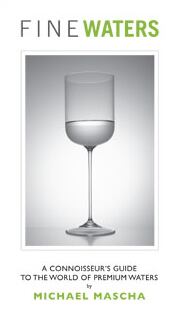Addressing delegates at Zenith International’s Premium Waters conference in Dubai on Tuesday, Mascha said: “I firmly believe we need to put the premium waters category on the table in terms of the epicurean context – distinguish this from hydration context.”
“Big brands commoditize water and you get the same things over and over again,” he said.
(Mascha, below, is founder and publisher of waters portal FineWaters.com, and has also authored a book – ‘Fine Waters: A Connoisseur’s Guide to the World of Premium Waters’.)
Presenting a photo along the same lines as the picture above, Mascha asked: “What’s wrong with this picture? Everything, I think. What we have here is the classic hydration picture.
“The two people are drinking from the bottle. They’re drinking on-the-go. They’re not sitting down at a table. You also notice that they’re not facing each other, they’re looking in opposite directions and there’s no interaction.”

Dubbing this the “commodity aspect of drinking water” – using ‘drinking’ as a verb here – Mascha said the consumption context made sense for hydration, but that he found it boring and preferred to enjoy water at a table in a social context.
“Of course, what those two people are drinking is H20, they’re hydrating. As I mentioned I find hydration boring – if you only care about hydration, water becomes water and you end up with commodity water or plain H20. What does this mean?” he asked the audience.
Common commodity water descriptors include: ‘the best’, ‘pure’, ‘clean’, ‘refreshing’, ‘convenient’, he said, before dismissing them as non-specific, nice-sounding linguistic filler.
“These are words that are very non-specific – they sound nice, and you put them on brands, on waters, in a context where you don’t have anything more specific to say,” Mascha said.
'Terroir' encompasses time and place
By contrast, premium brands needed to differentiate to focus more on where they’re coming from, rather than using such generic words, he said.
“What excites me is premium water – I consider it to be the story of a natural product with terroir that holds experiences and gives wellness, that’s my overarching definition of a premium water,” he said.
“So terroir – you know where the water’s coming from, you feel an emotional connection to the place. The water could be spring, artesian, mineral, iceberg, glacier, etc. It expresses this terroir and taste difference.”
Terroir also encompasses time, Mascha said, drawing a contrast (for illustrative purposes) between, say, Icelandic iceberg water that is 50,000 years old and young rainwater from Tasmania.
What's on the water menu?
“With a premium brand you’re not selling water – you’re selling a story, and you want to manipulate the product as little as possible to maintain terroir for the people enjoying water on the table,” Mascha said.
“Also, there’s no ‘best’ water – we need to enjoy the differences between waters, tie it into food pairing and matching. Agree or disagree on what the ‘best’ water is, but make it part of the conservation,” he added.
Once you have terroir, and a nicely bottled premium water brand on the table – in a restaurant, say, or at home, Mascha said you then needed appropriate glassware to distinguish water from wine and the drinking vessels associated with that category, or to stop it being served in an ugly glass, or even plastic, tumbler.
“For me Epicurean integration is really on the table, sitting down. And food pairings will communicate the etiquette that allows us to use water menus, with glassware that signals why we’ve really arrived at a category, as per when you have different glasses for different wines,” he said.

Bespoke glassware and upgraded ice?
Beyond bespoke glassware, terroir and taste (communicated through water menus - one example we found online, and embedded above, is that of Ray's & Stark Bar in Los Angeles - and by brands themselves), Mascha said premium water marks could also “upgrade ice”, even branding it perhaps, to tap the booming cocktail culture.
He is steadfast in his belief that that premium water brands should steer clear of health claims, as well as junk science “that was probably OK 100 years ago, but science has moved on since”.
“I think health claims should be made very carefully, I’m very happy that many governments don’t allow people to make health claims anymore – the place for the water is on the table, not in the medicine category, and premium water is an epicurean product, not a health product,” he said.
'I pay a lot of money for the food, I want a proper water on the table!'
Summing up, Mascha told his audience: “In an Epicurean setting, drinking tap water doesn’t make sense. I pay a lot of money for the food, I want a proper water on the table – premium waters are about authenticity, exclusivity, status, experience, luxury – there’s a lot to get excited about.”
“I think premium water can be as exciting as wine on the table, and that’s what we’re trying to do – turning water towards the wine concept, and we have to put the effort into that,” he added.
“If you go out there and tell that story, talk to sommeliers, I think we will all succeed in pushing the category forward,” Mascha said.
